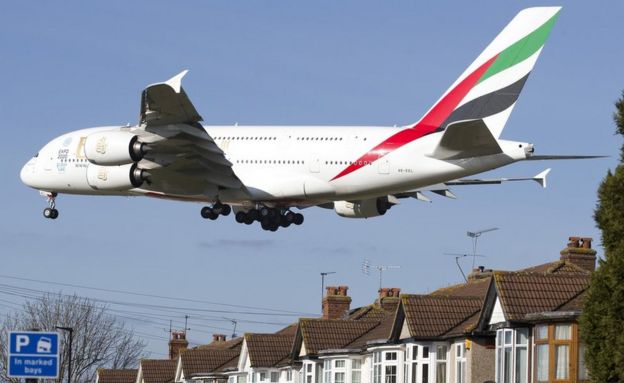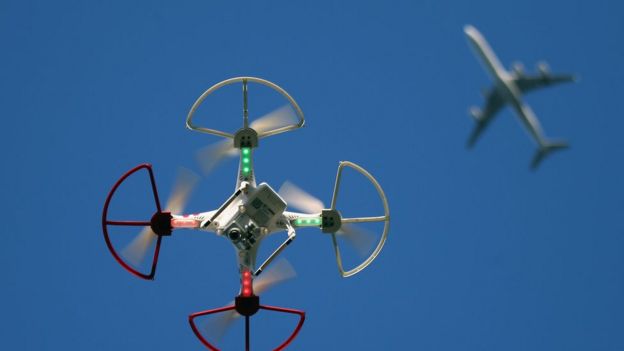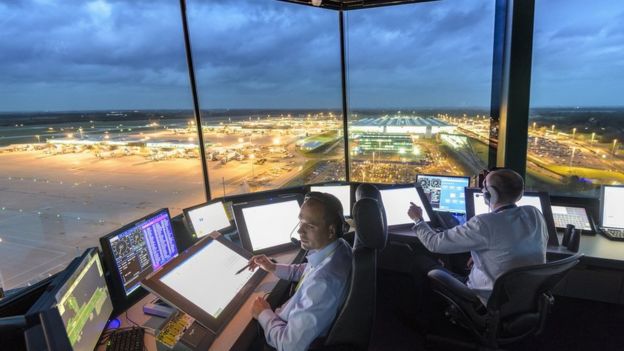Air traffic controllers are warning that UK skies are running out of room amid a record number of flights.
Friday is likely to be the busiest day of the year, with air traffic controllers expecting to handle more than 8,800 flights - a record number.
They have called for a drastic modernisation in the way aircraft are guided across UK airspace.
It comes as the government launches a discussion to shape the UK's aviation industry for the next 30 years.
Air traffic controllers expect to manage a record 770,000 flights in UK airspace over the summer - 40,000 more than last year.
But the ability of the the UK's National Air Traffic Control Service (Nats) to deal with this surge is being stretched to the limit, it is claimed.
Nats director Jamie Hutchison said: "In the last few weeks we have already safely managed record-breaking daily traffic levels, but the ageing design of UK airspace means we will soon reach the limits of what can be managed without delays rising significantly."
The Department for Transport estimates that, if airspace management remains unchanged, there will be 3,100 days' worth of flight delays by 2030 - that is 50 times the amount seen in 2015 - along with 8,000 flight cancellations a year.

The government wants the public to submit ideas on a wide range of subjects, from airport bag check-ins in town centres to noise reduction targets.
The six themes it will consult on over the coming months are:
- Customer service
- Safety and security
- Global connectivity
- Competitive markets
- Supporting growth while tackling environmental impacts
- Innovation, technology and skills
Transport Secretary Chris Grayling said: "Our new aviation strategy will look beyond the new runway at Heathrow and sets out a comprehensive long-term plan for UK aviation.
"It will support jobs and economic growth across the whole of the UK."
He said the government wanted to consult "as widely as possible" over the next 18 months on its new aviation strategy.
"We've got to get through the Brexit process, we've got to conclude the negotiations, we need to have new agreements with countries like the United States and Canada," he said.
"I'm off next week to meet with my US counterpart to talk about how we make sure that aviation across the Atlantic has a strong future with all the growth potential that's there."
Martin Rolfe, chief executive of Nats, said the government consultation process could take between two and three years, "so millions and millions of people will have a say in aircraft flying over their house".
He told the BBC's Today programme: "Local communities are very obviously concerned about what more traffic might look like, but actually modernising [airspace] means we can keep aircraft higher for longer.
"We can have them descend more steeply than they currently do because modern aircraft are more capable than the types of aircraft that were in service when this airspace was originally designed."

Meanwhile, airport capacity is expanding way beyond Heathrow's new runway.
Friday also marks the start of a £1bn investment programme to double the size of Manchester Airport's Terminal 2.
The number of planes taking off and landing at Stansted has gone up every month for almost four years.
Cardiff Airport has seen an 11% rise in traffic, and Luton is recording growth of 7% this year alone.

The problem of volume has been complicated by shifts in travel patterns.
Destinations including Egypt, Turkey and Tunisia have lost out to Spain, Italy and the US, which means major changes in the flows of traffic into UK airspace.
Nats itself is rolling out a new £600m computer system known as iTec that could result in more flights and fewer delays.
No comments:
Post a Comment